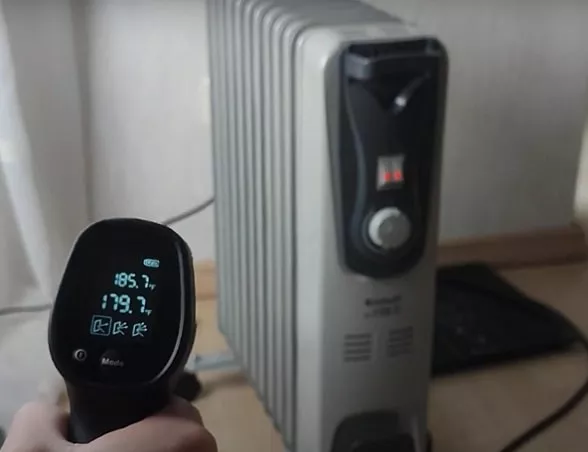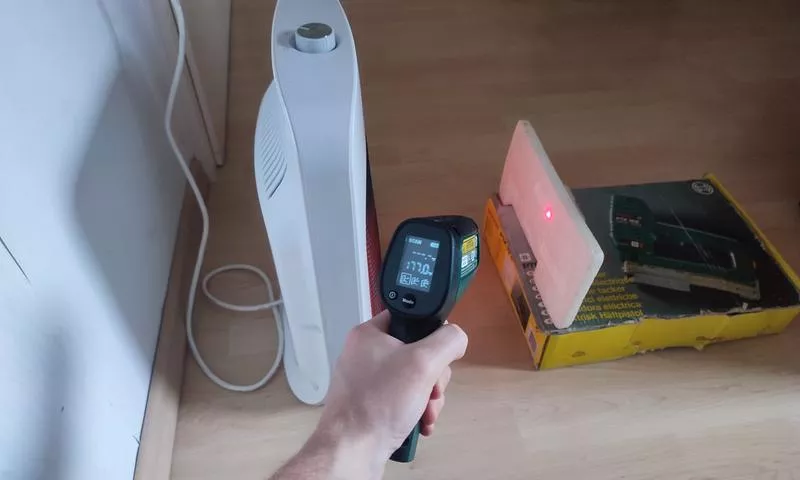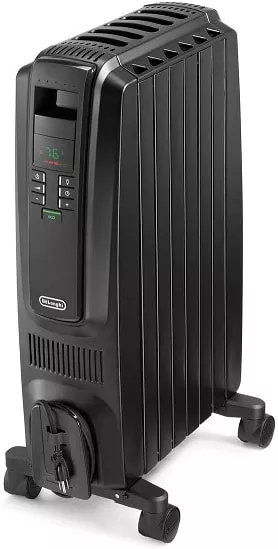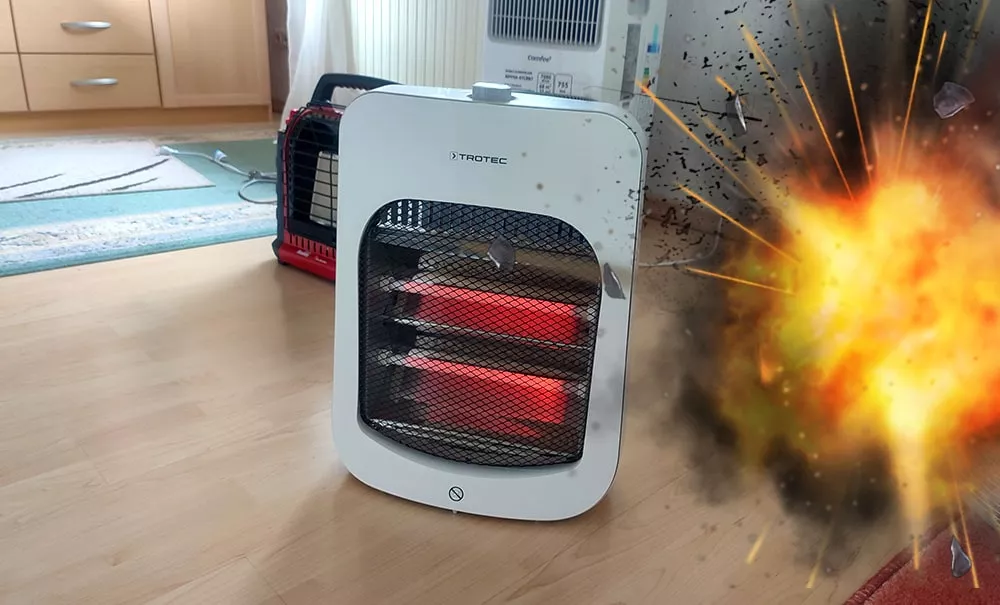Can space heaters explode? Space heaters can catch a fire if you use them incorrectly. But will they explode?
That’s important because an explosion could stun you and limit your ability to take action.
Hi, I am Daniel, an electrical engineer, and in this article, we’re going to check whether space heaters can explode and the fascinating engineering behind explosion-proof space heaters.
Luckily, space heaters don’t explode. In fact, it’s impossible for a space heater to explode. Let’s have a look.
Quick answer: Space heaters can’t explode by design. Explosion always requires pressure buildup that quickly releases. Only oil-filled radiators can build some pressure when the oil heats up. But the pressure is too low to cause an explosion. Other space heaters such as ceramic heaters or infrared heaters can’t explode.
But why can’t space heaters explode? They start fires. So why are there no explosions?
In addition to answering these questions, I’ll also list my recommended explosion-proof space heater at the end of this article!
Why space heaters never explode
First of all, let’s have a quick look at space heaters that obviously never explode. No question about it:
Electric heating elements are explosion-proof
Simple electric space heaters such as ceramic heaters or coil heaters can’t possibly explode.
They produce heat purely by forcing an electric current through a resistive heating element, for example, a ceramic heating element or a metal coil.
Explosions are impossible in these heaters since an explosion would require an extreme release of energy. Which is not the case here.
In these space heaters, no significant amount of energy builds up. Sure, there is a heating element inside which gets quite hot.
But what’s the worst thing that can happen to a hot piece of ceramic? Ceramics can withstand temperatures up to 3,600°F (approx. 2,000°C ).
Also, ceramic is very temperature shock resistant. So, it won’t crack, even if the space heater heats it to high temperatures instantly.
The same is true for coil-based or carbon-based heating elements. All of those are simple electric resistances with physical properties that allow them to withstand high temperatures and high currents and have high shock resistance.
Oil in an oil-filled radiator makes it explosion-proof
Oil-filled radiators, on the other hand, not only drive current through a heating element. There is another “layer” of engineering:
The heating element is embedded in a fully sealed metal heating body. No oil can ever leave this metal body since it is perfectly sealed.
 I am pointing my laser thermometer at the oil-filled metal body of my oil-filled radiator! Because of the finned design, heat disperses quickly and pressure can’t build up inside! Additionally, oil does not boil at these low temperatures, which is why it doesn’t build pressure.
I am pointing my laser thermometer at the oil-filled metal body of my oil-filled radiator! Because of the finned design, heat disperses quickly and pressure can’t build up inside! Additionally, oil does not boil at these low temperatures, which is why it doesn’t build pressure.
Now that’s where many would expect potential for explosion.
If the heating element heats up the oil inside an oil-filled radiator, the oil expands, pressure builds up and the metal body containing the oil explodes.
But that’s not how it works!
In fact, the oil inside the metal body is used precisely because it does not build significant pressure if you add heat to it.
In contrast, if you replace the oil in an oil-filled radiator with water, the radiator will explode!
One of the main reasons is the expansion of water with increasing temperature. Water initially expands only slowly.
Think of a pot of hot water - the water level doesn’t rise noticeably if you heat water from room temperature to 100°C (boiling point).
But as soon as water starts boiling, it vaporizes and the amount of space water takes up (in its gas form) explodes!
Oil on the other hand has a much higher boiling point at around 570°F (300°C). And below that boiling point, it does not expand much.
Since the oil in an oil-filled radiator constantly absorbs heat from the heating element and distributes it into your room, the oil can never overheat and thus never explode.
Oil-filled radiators are the safest space heaters.
How temperature control makes space heater explosions impossible (overheat protection & thermostat)
Modern space heaters often use a two-point control system for temperature regulation.
Two-point control is the simplest form of a thermostat that has both an “on” and an “off” setting at specified temperatures, ensuring that the heater neither overheats nor becomes too cold.
Two-point control explained
- Upper Limit: Once the heater reaches a predetermined maximum temperature, the two-point control system shuts off the heating element, ensuring that the device does not overheat.
- Lower Limit: If the temperature falls below a certain level, the control system automatically turns the heating element back on to maintain a comfortable environment.
- Automatic Monitoring: This system constantly monitors the temperature, ensuring it stays within these two points, thereby maintaining a stable and safe temperature range.
A thermostat keeps the space heater’s temperature in a safe range.
Space heater surface temperatures are safe
Space heaters generally operate within a range of temperatures well below what would be required to cause materials like metals or plastics to become unstable or combustible.
Typically, electric space heaters can get as hot as 150 to 600 degrees Fahrenheit (65 to 315 degrees Celsius), depending on the model and settings.
There’s one exception: Infrared heaters can generate much higher surface temperatures of up to 900°F right in front of the heating elements.
Due to their design, infrared heaters have to expose their heating elements.
However, due to the nature of infrared radiation radiating away from the heater and not heating the air, these temperatures only occur when you place an object right in front of the heater.
So, infrared heaters are also safe if you use them correctly.
 Infrared heaters heat up objects right in front of them. So, keep the space in front of an infrared heater free!
Infrared heaters heat up objects right in front of them. So, keep the space in front of an infrared heater free!
Material Safety
- Flame-Retardant Plastics: Most space heaters with plastic casings use specialized, flame-retardant plastics that are stable at the temperatures generated by the heating elements.
- Heat-Resistant Inner Components: The inner components that actually generate the heat are usually made of materials that are very good at withstanding high temperatures, such as certain metals or alloys. These are kept well isolated from the external plastic casing.
- No Explosive Fuel: Electric space heaters don’t contain any form of combustible fuel like propane or gasoline, eliminating the risk of an explosion due to fuel leak or combustion.
By using flame-retardant and heat-resistant materials and a simple temperature control like the two-point control, modern space heaters are designed to operate safely within their specified temperature ranges, virtually eliminating the risk of an explosion.
There is no place in a space heater where pressure can build up
An explosion always follows pressure build-up. But there is no space in a space heater where pressure can build up and cause an explosion.
Space heaters are fundamentally different from pressurized containers or systems like gas cylinders, boilers, or certain types of engines where pressure can accumulate.
In fact, the exact opposite is true. The fundamental point of a space heater is to distribute heat away from itself. To do that, it must allow airflow exchange.
A closed space where pressure can build up in a space heater would make absolutely no sense.
Space heaters are too simple to explode
A space heater is too simple a device to explode. They don’t have chambers that explode. And they don’t contain sensitive parts that suddenly explode.
I’d even argue that space heaters partly are explosion-proof because they are so simple .
After all, every space heater is just a device that transforms electricity into heat.
Aside from a thermostat and a few safety features, there is nothing inherently complex in a space heater.
Can any part inside a space heater explode?
Capacitors inside a space heater could burst under extreme conditions like high-voltage surges.
Practically, however, this is unlikely, since testing laboratories only certify space heaters that can withstand voltage surges (as we see later in the article).
It’s important to note that a “bursting” capacitor is not a true explosion; it generally results in a popping sound and some smoke, without catastrophic damage.
Immediately after a capacitor pops, a space heater usually turns off. So, there is no risk inherent to it.
Additionally, built-in safety features like fuses and overvoltage protection make such incidents highly unlikely.
And even if such a voltage surge damages your space heater, that’s not the space heater’s fault. Voltage surges come from your neighborhood’s power grid, not from your space heater. And if you get such a surge, likely other devices get damaged as well.
So, this is not a risk specific to space heaters.
How to reduce the chance of exploding capacitors in a space heater
The risk of capacitors bursting in a space heater is already minimal due to built-in safety mechanisms like fuses and overvoltage protection. However, you can further reduce this risk by:
- Using a surge protector to absorb voltage spikes.
- Regularly inspecting the space heater for signs of wear and tear, particularly in the electrical cord and plug.
- Unplugging your space heater when you don’t need it.
In summary, while the term “exploding” is technically not accurate for what happens to capacitors under extreme conditions, the risk is minimal and can be further mitigated through proper usage and precautionary measures.
Do you need to worry about space heater safety?
Do space heater safety standards check for risk of explosion?
Nowadays, space heater manufacturers go through extensive standardized testing. A space heater with a safety certification just sells much better.
One of the most widely recognized safety certifications for space heaters in the United States is the UL (Underwriters Laboratories) standard.
UL Standard tests for explosion safety
Here are some of the relevant tests they execute:
- Temperature Test: This test ensures that the space heater operates within a safe temperature range and doesn’t overheat, thereby eliminating the risk of explosion due to overheating.
- Flammability Test: This test checks that the materials used in the heater, often plastics or metals, are flame-retardant and do not contribute to fire or explosion risks.
- Dielectric Voltage-Withstand Test: This test is designed to ensure that the space heater can handle potential voltage spikes without breaking down, which could otherwise cause a capacitor to burst (as discussed earlier).
- Abnormal Operation and Fault Tests: These tests simulate malfunctioning conditions to make sure that the space heater has appropriate safety mechanisms, like thermal cut-offs, that engage to prevent hazards including possible explosions.
Safest UL-certified explosion-proof space heater
I’ve already written articles on the safest space heaters, so feel free to have a look!
Article: What is the safest space heater?
In summary:
The safest space heater that is also UL-certified is this De’Longhi oil-filled radiator (click here to view it on amazon).
It comes with all the safety features you need. And, as an oil-filled radiator, it is safe by design.

Conclusion
Space heaters can’t explode. By design, space heaters make explosions impossible.
They have no chamber or system where pressure could build up. They are equipped with high-grade materials that can withstand high temperatures, as well as robust temperature control systems to prevent overheating.
Even components like capacitors, which could theoretically burst, are not explosion risks in the conventional sense.
For those still concerned, always look for heaters that are UL-certified, as these have been tested to ensure they operate safely and effectively, even under voltage surges.
Using a surge protector can further minimize the already non-existent risk of a space heater explosion.
Stay warm and stay safe!
